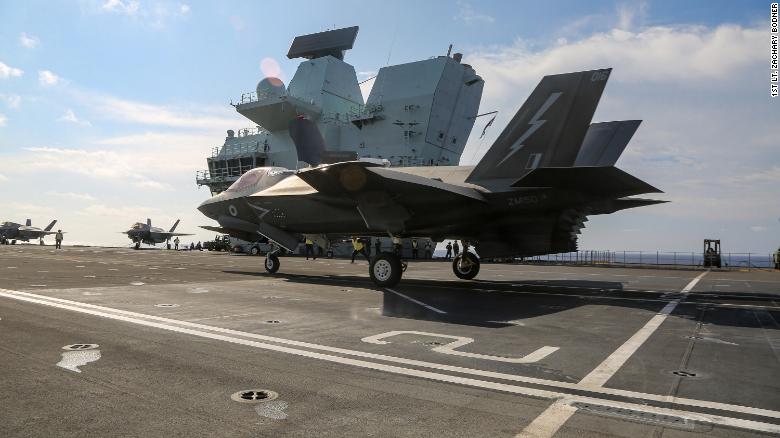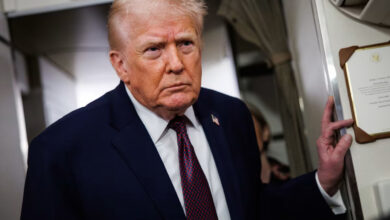
Hong Kong (CNN) – When Russian armed forces launched an unprovoked assault on Ukraine last month, Beijing appeared to side with Moscow, accusing the United States and its NATO allies of inviting conflict by allowing their security bloc to expand eastward.
Now, as China faces pressure from the West to condemn the Russian invasion, it’s ramping up similar rhetoric to talk about America’s footprint in Asia.
In recent days, senior Chinese Foreign Ministry officials and influential Communist Party publications have accused the US of seeking to build a NATO-like bloc in the Indo-Pacific, with one official warning of “unimaginable” consequences if it does.
At a conference in Beijing on Saturday, Chinese Vice Foreign Minister Le Yucheng said the Ukraine crisis could be used as a “mirror” to view the security situation in the Asia-Pacific region.
Le didn’t name the US, but he explicitly referred to the Indo-Pacific strategy — a plan the Biden administration detailed last month to strengthen America’s role in the region, such as through supporting democracy and bolstering its alliances and partnerships, including with Taiwan.
Building “closed and exclusive small circles or groups” in the region “is as dangerous as the NATO strategy of eastward expansion in Europe,” Le said at the event at Tsinghua University, according to a version of the speech published by China’s Foreign Ministry.
“If allowed to go on unchecked, it would bring unimaginable consequences, and ultimately push the Asia-Pacific over the edge of an abyss,” he said.
China’s criticism of NATO follows attempts to portray itself as a neutral actor in the Ukraine crisis, refusing to denounce Russia’s attacks on civilians, while stressing its humanitarian aid to Ukraine and denying it considered providing military support to Moscow.
However, China’s bid to draw parallels between the US strategy in the Indo-Pacific and NATO’s “eastward expansion” in Europe closely echoes talking points from Moscow, raising serious doubts as to Beijing’s supposed neutrality.
Russian leader Vladimir Putin has repeatedly attempted to use concerns over NATO to justify his brutal invasion of Ukraine. Now, experts say China is seeking to use the current crisis in Ukraine to not only amplify its portrayal of the US as an alleged instigator of conflict, whether in Europe or in Asia, but to warn of the consequences if the US and countries in the region align against China.
China ‘takes advantage’ of crisis
Washington’s emphasis on the Indo-Pacific has come as China pushes a more aggressive foreign policy, doubling down on its territorial claims, while taking a harder line in response to perceived challenges.
In recent years, China has disavowed a UN tribunal ruling dismissing its vast territorial claims in the South China Sea, while continuing to militarize its positions there and harass other claimants. It’s also ramped up its threats on self-governing Taiwan, with record incursions of fighter jets into the island’s air defense identification zone in recent months.
“It’s no surprise that China would take advantage of the Ukraine crisis to lash out at the Indo-Pacific strategy,” said Li Mingjiang, an associate professor and Provost’s Chair in international relations at S. Rajaratnam School of International Studies (RSIS) at Singapore’s Nanyang Technological University.
Li pointed to China’s “growing anxieties” over the rejuvenation of the “Quad” security forum between India, Japan, Australia and the US, and of the AUKUS security pact between Australia, the United Kingdom and the US, as well as the strong commitment from the US to maintain its longstanding role in the region, outlined in Biden’s Indo-Pacific strategy last month.
“The intention is clear — China wants to send this message to the US and countries in the region that the Indo-Pacific strategy and American security alliances could also generate some similar security dynamics (to those) seen in Europe, involving Russia,” Li said.
That message is also being sent ahead of an “extraordinary” NATO summit on Thursday, where US President Joe Biden will meet allied leaders in Brussels to discuss the situation in Ukraine — in another showing of the striking solidarity of the bloc since the start of the crisis.
A message to America
Vice Foreign Minister Le’s warnings about the US presence in the Indo-Pacific were echoed Monday by the Chinese Ambassador to ASEAN at a news conference in Jakarta.
There, Ambassador Deng Xijun accused the US of “creating a set of ‘gang rules’ while claiming to uphold the international order” and taking the region “down an evil path,” according to Chinese state-run media The Paper.
A similar tone was adopted in an opinion piece in China’s People’s Liberation Army Daily, republished last weekend on the website of the influential Communist Party journal Qiushi, which took aim at the Indo-Pacific strategy and said the US creation of blocs was an “important reason for the continuing souring and escalation of the Ukraine issue.”
This is not the first time that China has sought to draw parallels between the US strategy in the Indo-Pacific and NATO in recent years, and the concerns get at the heart of a key stance that has drawn Russia and China closer together: their mutual distrust of the US.
That was underlined in a 5,000-word joint statement released weeks before the invasion of Ukraine, in which both voiced their opposition to the “further enlargement of NATO” and pledged to “remain highly vigilant about the negative impact of the United States’ Indo-Pacific strategy.”
But experts point out there are vast differences between NATO, a security alliance, and the US strategy in Indo-Pacific, which is not just about security, but includes a range of policies. The US, with its own long Pacific Ocean border and island state of Hawaii, also has territories in the Indo-Pacific, including Guam.
Other nations have also increased activities in the region in an effort to counter China’s influence. In the past year,
Britain sent its largest concentration of maritime and air power for joint exercises in the Philippine Sea, while Germany sent a warship through the South China Sea for the first time in almost two decades. France also last year announced a plan to boost its maritime cooperation with the South Pacific. China has often pushed back against such actions, decrying what it sees as efforts to contain it.
The Chinese stance, meanwhile, ignores the fact US security partnerships have come in response to China’s own rapid military modernization, according to Drew Thompson, a senior research fellow at the Lee Kuan Yew School of Public Policy at the National University of Singapore.
The US is “increasingly drawn into deeper and stronger security alliances because of (China’s military) modernization” and Beijing’s “lack of openness and transparency” toward its neighbors about its intentions, Thompson said.
But China’s leaders “don’t see a connection between other countries in the region hedging against China’s military modernization” through relationships with the US, he added.
The question of Taiwan
Another issue much closer to home may also explain why China is keen to call up its concerns over the US in the Asia-Pacific region amid the Ukraine crisis — Taiwan.
This was suggested in a 110-minute video meeting between US President Joe Biden and Chinese leader Xi Jinping on Friday, where Xi’s concerns regarding Taiwan were clearly a focal point for the Chinese side.
“Some people in the US have sent a wrong signal to ‘Taiwan independence’ forces. This is very dangerous. Mishandling of the Taiwan question will have a disruptive impact on the bilateral ties,” Xi told Biden, according to a Foreign Ministry readout.
Analysts have drawn comparisons between the authoritarian threats to Ukraine and Taiwan, a self-governing island democracy which Beijing claims as its own and has not ruled out taking by force. Earlier this month, a group of former US defense and security officials traveled to Taipei in a signal of American support amid the European crisis.
This connects too with China’s larger concerns in the Indo-Pacific, said RSIS’s Li.
“If there’s a conflict over the Taiwan issue, a worst case scenario (for China) would be that China would not only have to fight a war against Taiwan, against the US, (but that) perhaps some US allies would be involved against China,” he said.




